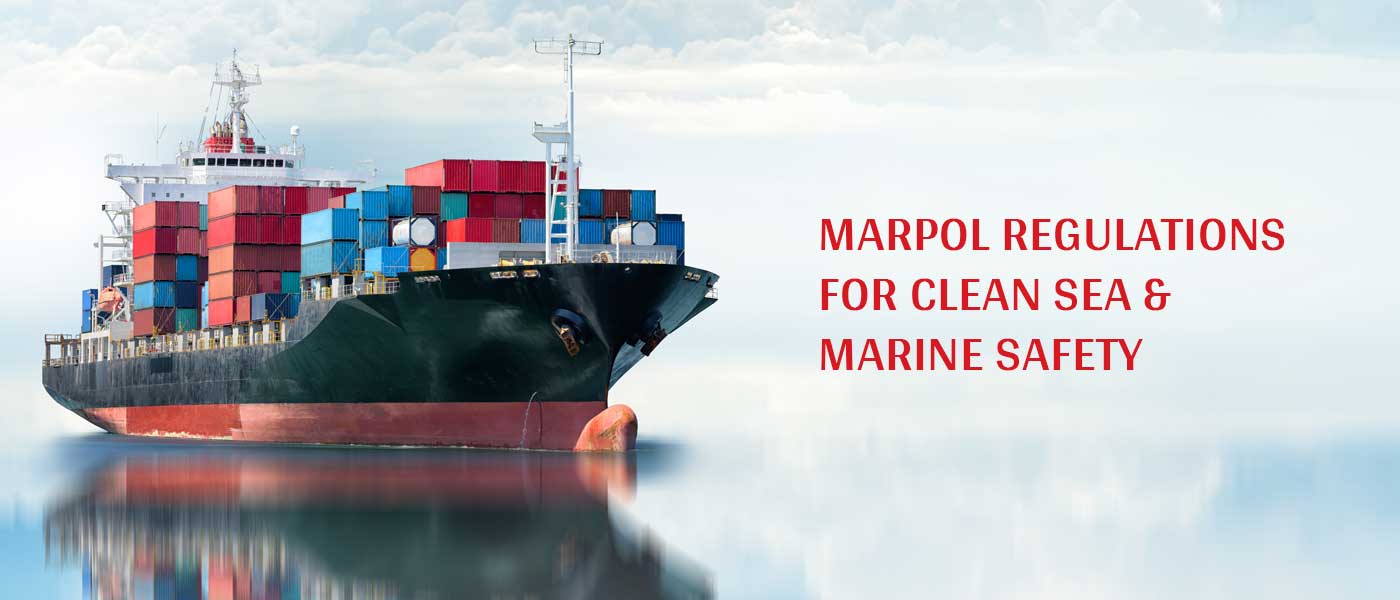Navigating Clean Seas: The Indispensable Role of MARPOL in Maritime Environmental Protection
- October 28, 2024
- Blog
For years, the environmental impact of shipping has been masked in secrecy, with vessel emissions and pollutants often confined to logbooks and undisclosed databases. As a result, the true environmental cost of maritime trade remained unclear. To combat this, the Marine Pollution (MARPOL) Convention was introduced on November 2, 1973, by the International Maritime Organization (IMO), establishing regulations to prevent and reduce pollution caused by ships.

MARPOL is one of the four pillars of the International Marine Organization framework for safeguarding and conserving the environment and water quality. Any liner or shipping line that operates a vessel in international waters should be updated with MARPOL guidelines, its clauses and best practices. The key purpose of MARPOL is the prevention of water pollution, by minimising activities like:
- Dumping of hazardous materials
- Prevent oil leakage and spills
- Excessive exhaust
The Marpol Convention takes into consideration both prevention and unintentional actions that can result in pollution. If any party is not adhering to the protocol, it may lead to fines and other sanctions.
Key MARPOL Regulations
The MARPOL Convention has six annex that detail specific regulations for various types of pollution:
Annex I (Established in 1983): Regulations for the Prevention of Pollution by Oil
This annex focuses on oil-related pollution like oil spills that may occur due to operational or accidental events. One of the major requirements of this annexe is to ensure oil tankers have double hills.
Annex II (established in 1983): Regulations for the Control of Pollution by Noxious Liquid Substances in Bulk
This annex regulates the discharge and carriage of harmful or toxic liquid substances transported in bulk. It notably prohibits the discharge of residual substances within 12 miles of the shore.
Annex III (established in 1992): Regulations for the Prevention of Pollution by Harmful Substances carried by Sea in Packaged Form
This annex addresses the detailed standards for packing, stowing, labelling, documentation, quantity limitations, notifications and exceptions of harmful materials transported by sea.
Annex IV (established in 2003) – Regulations for the Prevention of Pollution by Sewage from Ships
This annex regulates sewage pollution, prohibiting its discharge at sea unless the ship is equipped with an approved sewage treatment plant. Disinfected sewage can be discharged more than three nautical miles from shore, while untreated sewage must be discharged at least 12 nautical miles away.
Annex V (established in 1988 and revised in 2013) – Regulations for the Prevention of Pollution by Garbage from Ships
This annex pertains to the management of ship-generated waste during routine operations. The vessels of 100 gross registered tons and above should have a Garbage management plant in place and records of garbage disposal should be maintained in the garbage record book.
Annex VI (established in 2005) – Regulation for prevention of Air pollution from ships
This annex deals with ways to prevent emissions from ships which may be due to accidental causes or routine operations. It sets limits on sulphur oxide and nitrogen oxide generated from ship exhausts. It also covers mandatory operational energy efficiency measures that help in reducing greenhouse gas emissions from ships.
MARPOL’s Impact on the Freight Industry
The implementation of MARPOL has profoundly impacted the freight industry by setting stringent standards for environmental responsibility. Shipping companies now need to invest in pollution control measures, from installing double hulls to optimizing fuel efficiency. As environmental regulations become more stringent, compliance with MARPOL not only protects marine ecosystems but also ensures the long-term sustainability of the shipping industry. By adhering to MARPOL, freight companies can minimize their environmental footprint, reduce operational risks, and avoid costly penalties, thereby contributing to a more sustainable global trade system.



